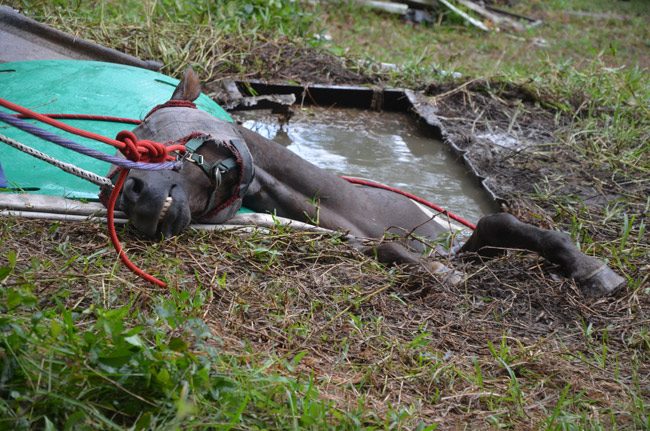
The 24-year-old horse’s name is Mercy. Barbara Jones gave her that name four years ago when she got the horse as a gift, a gesture she compared to a gift of mercy: Jones suffers from anxiety and other health problems, the horse has been a salve, the bond between them couldn’t be closer–to hear her describe it–than some bonds between family members. Her children aside, Mercy might as well be the love of her life.
“God did me mercy and blessed me with her, and every time I call her name I start thinking, oh my God, he showed me mercy and continues to show me mercy, he blessed me with her,” Jones says of her horse. “I love her so much, we have such a close bond, there’s nothing, nothing I can’t do to that horse. Ask her, this is my oldest daughter Misty, there’s nothing I can’t do to her, I can walk underneath her, I can walk between her back legs, anything I want to do to her, I do it. I love her so much. She slid down a real steep hill, cut her back leg, tore off the half of her leg. For over a week I stayed in an overhang, slept with her, to make sure that her bandages were changed and she was kept clean.”
Late this morning one of Jones’s children ran into the house at 3505 Clove Avenue in the Mondex, or Daytona North, “she comes flying in the house screaming, Mom, Mercy is in the septic tank,” Jones said. Jones thought it was a joke. She had no reason to think anything could fall into her slightly elevated septic tank, let alone her horse. She ran out, and there was Mercy, thrashing as it attempted to get out. Mercy was impossibly stuck, though lucky for the horse she’d fallen in back end first. Her head was sticking out, barely resting on the earthen border of the tank, one of those older styles common in the Mondex, covered in Plexiglas-type plastic instead of concrete.

It was just before noon. So began an ordeal that was not to end until 3 p.m., when Mercy was finally pulled out, tired, sedated–to reduce her pain and thrashing–bearing a few superficial injuries, but otherwise fine: within 20 minutes, she stood up, took a few steps, took a few more, then stood, her head near the ground, pliant to the cleaning and salves she was receiving from rescuers turned caregivers.
By then nearly a dozen agencies had gathered, including Flagler County Fire Rescue, St. Johns County Fire Rescue’s Large Animal Rescue team, the county’s public works department (road and bridge brought an excavator), a veterinarian and an assistant from the Shelton veterinary Clinic in Bunnell, Flagler Septic Services, John Haven, the executive director of the College of Veterinary Medicine at the University of Florida in Gainesville (he leads the Disaster Response Team), and of course Steve Williams, the Flagler County Sheriff’s agriculture deputy who was first at the scene when 911 got the call at 11:55, and whose furrowed expressions, comforts to Mercy and tireless efforts with the harnesses reflected the afternoon’s anxieties until the horse was pulled out.
It hadn’t been easy. It hadn’t been without several failed attempts along the way, one of them with the excavator attempting to pull at harnesses. But every time a harness–a fire hose, a rope, a coil–would slip out of where rescuers needed it to be so as not to harm the horse. Mercy was at least twice pulled a third of the way out as rescuers and others all around let out words of encouragement. But she slunk back or was eased back as one problem or another developed. Any misplaced rope could have broken bones or skin. Rescuers weren’t taking chances. Through much of it a spitting rain kept adding to the rescuers’ sweat and the naturally boggy mess and stench of the scene, building up to the afternoon’s heaviest downpour just as the final rescue was readied, and Mercy made her way out.
That was after John Haven had arrived, around 2:30, and he proposed a new approach that turned out to be the most successful one.
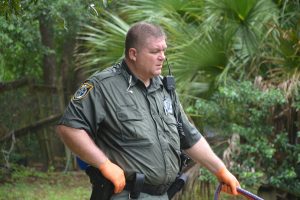
“We want to be able to do essentially a low-angle drag of the animal,” he said just before the actual rescue was executed, and when Haven didn’t (as most people at the scene did not) yet know the sex of the horse. “To get him out and over the edge, we have a special piece of webbing that’s designed for doing this versus trying to do it with a fire hose, so the animal won’t slip out of it this time, and then we’re going to use that rescue glide between that big piece of green sheet, we’re going to wedge that between the animal and the ground so the animal doesn’t scrape coming over the edge.”
It worked–not like a charm: there’s nothing charming about a horse getting rescued out of a tank of human waste, but all told, it finally worked without a hitch (and without the excavator) as the horse was sluiced out, Williams and a dozen men pulling at various harnesses in such a way that it looked as if Mercy was being slid out of a nightmare back into consciousness. Her actual consciousness wasn’t far behind.
“The people that got here early on did a great job of securing the animal so that she was obviously exhausted,” Haven said, “so she could have actually drowned, but they secured her with the fire hose, they got a hold of her head, they got a halter on her, they got a lead rope on her, they did all the important things to make sure it didn’t get worse before we got here. They did a great job with that.”
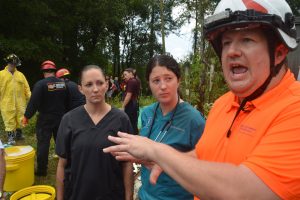
Jennifer Lockwood, a veterinarian at the Shelton Veterinary Clinic in Bunnell, had come to the scene with Jenny Ireland, a veterinary technician on her first day on the job. Williams had contacted Lockwood, having worked with her often. “Our biggest concern was that she could be paralyzed because she was laying on her shoulder for a very long time,” Lockwood said of Mercy. “There’s a nerve that runs through there that if they put too much pressure on it for too long, it could cause paralysis. But they were able to get her out relatively fast and she’s standing on all fours right now. Really pretty superficial cuts and only a few of them, so that’s great. No active bleeding. That’s awesome. Breathing good. She’s painful. I’m sure she’s going to be sore for a few days, just putting pressure on those legs, but she’s really doing pretty well overall.”
The water in the tank had, however filthy, created enough buoyancy to keep her from scraping or injuring herself more severely. She’ll be treated with antibiotics and pain relievers to ensure that the wounds don’t get infected. She was hurt mostly on her left side.
Williams, the agriculture deputy, said the whole Mondex region has septic tanks that could be as risky as the one on Clove Avenue. He spoke with relief after the rescue operation. He’d been first to arrive at the scene, as is often the case when animals are in trouble in the county: Williams’s is the first face they see, after their owner–if the owner is around, and if the animal isn’t wild. “The horse struggled for probably an hour before we actually got here,” he said, as the horse may have been in the tank for more than half an hour before anyone at the property had noticed.
“I feel for the animal, I mean, we’re here to help those that can’t help themselves. If it weren’t for us, the animal would die,” Williams said, giving credit to the many agencies at the scene. “We were able to save this animal, which was great.” Williams has rescued fawns, fully-grown deer, alligators, horses, cats and dogs of course. He’s well known in the western part of the county, the still-agricultural part where farming and animal husbandry isn’t the outer-planet phenomenon it might seem to most Palm Coast residents.
He was asked after the rescue why he had chosen to be the agriculture deputy. “I guess I like dealing with animals more so than I do with people,” Williams said. “When you see all the bad publicity on TV with animal abuse and stuff like that, somebody’s got to help them, somebody’s got to speak out for them. They can’t do it for themselves. It’s very hard.” He sighs, as if to say he’s just one person. “I guess it’s very hard to be everywhere at the same time. When we can help something out like this, and make sure there isn’t an animal abuse problem going on, then yeah, that’s where I’m at, because they can’t defend themselves. Somebody’s got to do it for them, and I don’t mind stepping up to the plate. That’s what I went to school for, that’s all this training I’ve had, the schooling I’ve had, it’s all geared toward animal rescue and the well-being of animals, whether it be dogs, cats or horses or livestock. Mostly for my job it’s livestock, but I do help out with animal control.”
Williams, like Mercy, was exhausted, having been with the horse more than anyone else among the rescuers. But his face was now more smiles than strains. Jones had given him a mother’s grateful hug right after the rescue.
The cooperation was not just focused on the horse.
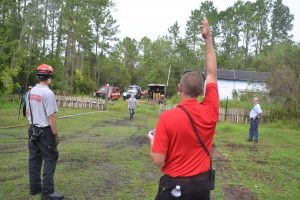
St. Johns, of course, in its mutual-aid agreement with Flagler, all-too often helps the county with its bomb squad and its hazardous materials team, and now has done so, more unusually, with its large-animals special operations team. “They’re great to work with,” Flagler County Fire Chief Don Petito said. “We go up and train them on doing wildfire stuff, and some incident management stuff, they come back and reciprocate by doing stuff for us. We allow their people to sit in on our classes that they need for their training, so we work very well together.”
“Definitely good training opportunity and good to work with the other county,” said Flagler County Fire Rescue Battalion Chief Richard Bennett, the incident commander this afternoon–with Lt. Andy Keppler as his deputy. “We had our technical rescue team that worked hand in hand with their technical rescue team. It was good for a large incident, if we ever have a large incident, we now know what each other can do and what each other’s equipment is. And the outcome was good. Horse came out alive.” Bennett had mobilized all the agencies that ended up at the scene within moments of getting the call from Williams.
“A couple of special thanks,” Bennett said. “Flagler Septic came, I called them, they came from 44 and I-95, 45 minutes from here, they came directly out. They beat Palm Coast. I called them too, I didn’t know who was going to get here first, Flagler Septic pumped the septic tank for free, and I arranged with the city of Bunnell for them to dump it, and the city of Bunnell allowed Flagler Septic to dump it for free, so it was no cost to the homeowner. That was nice.”
By 4 p.m., 3505 Clove Avenue was almost back to its ordinary self but for the gaping, empty septic tank.
![]()
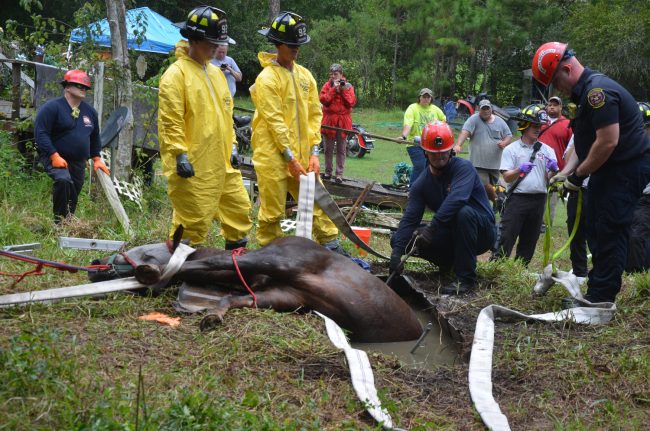
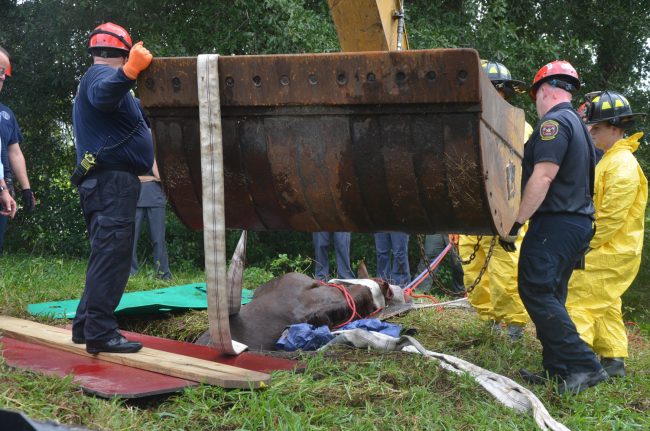
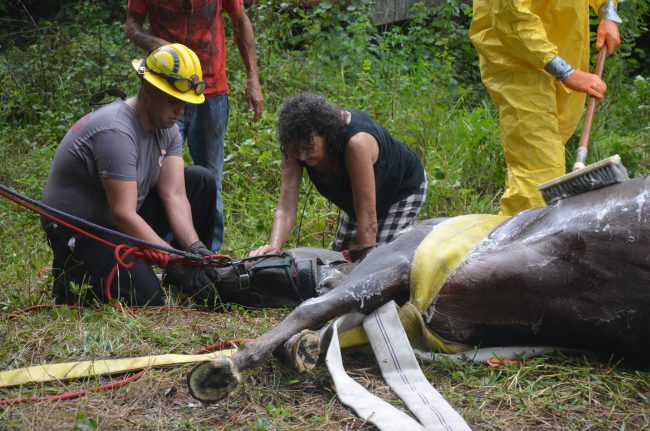
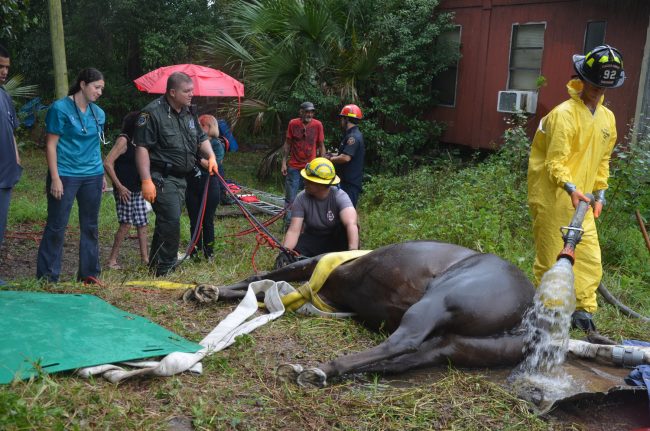
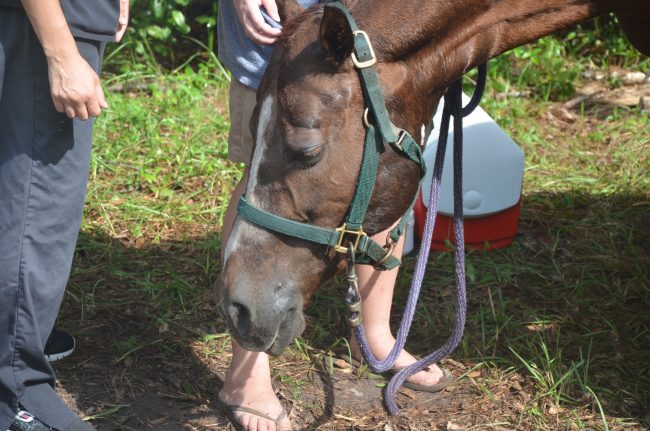





























Bc. says
Great job to all that were envolevd with the rescue that saved her life great work to all. It’s refreshing when a tragedy can be altered by a few caring people.
Pat says
Thank God for all these wonderful that saved Mercy. They are very special. Thank you
Roy says
Great job B-shift.
Chalcedony says
Big big thank you to everyone who helped rescue this beautiful gal. <3
Oh WOW says
Thank all of those wonderful people that saved that horse.. I am so happy to know that people care. WOW
Sw says
Yeahhhhhh
PJ says
With love from us all.
Heather says
I sure hope the new Sheriff keeps Steve Williams! And thanks to our first responders who never let us down.
PAT PATTERSON says
Excellent job to all those that participated in this recovery. Well done!
BlueJammer says
Thank you, FlaglerLive, for a great story! And, once again, thank you first responders!
Anonymous says
What a happy ending. Kudos to Molly and her rescuers. Wonderful caring people. Great job!
wh
BETTY FRITCH says
Was Mercy wearing a blindfold when she fell into the septic tank?
Cleanourneighborhood says
Flagler County code enforcement should be there and issue a violation for health, safety, and welfare concerns.,that septic should be replaced and junk, litter and debris cleaned.
Born and Raised Here says
A good team effort by our local agencies.
Oldseadog says
A wonderful story of love and dedication!
I just love a story that has a nice ending—-something that one rarely sees
in the news media today.
Brian says
What a wonderful story – Thanks and kudos to everyone and all agencies involved.
ELIZABETH says
It is nice to know that there are still so many caring people out there to help this animal and her family. You never gave up and I am proud of all of you for showing many that there are happy endings amongst so much tragedy we have been seeing lately.
THE VOICE OF REASON says
Cleanourneighborhood:
Methinks you just like to be negative. The story clearly said it’s the type of tank that is commonplace in the area. As for junk, litter and debris, it’s the country, for heaven’s sake! That’s the way it is there. It’s not like living on a golf course.
Geezer says
Hats off to the people who worked so hard to rescue Mercy.
This is one of those stories where one is reminded that good
people do indeed remain.
And Mercy: she is a beauty.
Rick G says
This has to be the top 2 or 3 best stories posted on Flagler Live. Thanks.
Concerned says
Wonderful efforts by all involved, thank you. Great story.